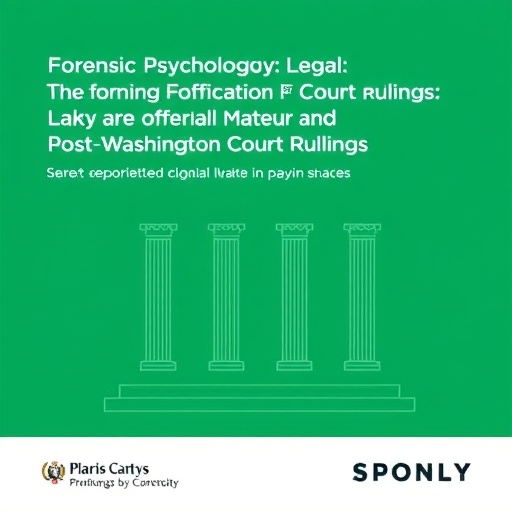In recent years, the intersection of psychology and law has become increasingly complex, particularly in the realm of forensic psychological evaluations. A groundbreaking examination by McLawsen underscores the ethical and legal challenges that have arisen in the wake of three pivotal rulings by the Washington State Supreme Court. These rulings have profound implications for how forensic psychologists conduct evaluations, the standards by which they are held, and ultimately, the outcomes of legal cases.
Forensic psychology, a discipline that blends psychological expertise with legal standards, plays a critical role in the judicial system. Evaluations are often utilized to assess the mental state of defendants, the credibility of witnesses, and whether individuals are competent to stand trial. The recent Washington rulings underscore contentious issues surrounding the balance of mental health assessments with legal rights, raising significant ethical questions for practitioners in the field.
First and foremost, the ethical dilemma for forensic psychologists often lies in their dual responsibilities. They are tasked with providing accurate assessments while being mindful of the potential for bias. The court rulings have spotlighted the need for clearer guidelines that delineate the boundaries of forensic psychologists’ roles. Should they act solely as evaluators, or do they carry a responsibility to advocate for the rights and mental health of those they assess? The tension between these roles can complicate an already challenging process.
Moreover, the rulings introduced nuances in how consent for evaluation is perceived and treated. In some cases, defendants may not fully understand what a forensic evaluation entails, leading to questions of consent validity. This becomes particularly problematic when minors are involved or when individuals are deemed incompetent to waive their rights. Such situations necessitate careful consideration of ethical standards, including the necessity of ensuring informed consent and understanding from all parties involved.
One of the most alarming aspects of these legal decisions is their potential to impact the reliability of forensic evaluations across various contexts. Critics argue that as evaluators navigate these newly defined boundaries, there is a risk of inconsistency in the application of psychological principles. This could lead to discrepancies in findings, ultimately affecting the justice process. The obligation of forensic psychologists to adhere to established norms and methodologies must be balanced with the evolving legal landscape defined by judicial decisions.
The implications for practitioners in Washington state extend beyond local cases. The ramifications of the findings may reverberate nationally, as other states consider their own standards for forensic evaluations. There is a growing recognition that the ethical challenges highlighted by these rulings are not isolated incidents, but part of a broader trend that demands a comprehensive reevaluation of forensic practices nationwide.
In navigating these tumultuous waters, it becomes critical for forensic psychologists to maintain transparency in their evaluations. Transparency serves as a safeguard against potential conflicts of interest, biases, and misinterpretations of findings. Psychologists must take active steps to document their methodologies and the rationale behind their conclusions to uphold the integrity of their evaluations.
The role of professional organizations also comes into play amid these developments. Leading psychological associations are being called upon to establish clearer ethical guidelines that consider the repercussions of legal rulings on forensic practices. Such initiatives not only safeguard the well-being of individuals undergoing evaluations but also protect the integrity of the psychological profession as a whole.
Research and training opportunities must be enhanced to support forensic psychologists in understanding the implications of these rulings. Continuing education will be paramount in ensuring that mental health professionals remain informed about legal standards and ethical practices. These efforts help cultivate a generation of forensic psychologists who are well-versed in both psychological principles and legal requirements, thereby fostering a more reliable evaluation process.
Moving forward, there needs to be a concerted effort to engage in multidisciplinary dialogues that can bridge the gap between legal frameworks and psychological evaluations. Collaboration among legal experts, psychologists, and ethicists could lead to more rounded discussions that entail a deeper understanding of both parties’ responsibilities. Creating spaces for such dialogue can pave the way for innovative solutions that address the dilemmas presented by the recent Washington state rulings.
In conclusion, the ethical and legal challenges stemming from the Washington State Supreme Court rulings present new frontiers for forensic psychological evaluations. As practitioners grapple with these developments, the need for clear guidelines, rigorous training, and interdisciplinary collaboration becomes ever more pressing. Ensuring that forensic psychology continues to uphold its ethical obligations is crucial not just for the individuals evaluated, but for the integrity of the justice system itself. It is through these concerted efforts that the field may evolve, addressing contemporary challenges while preserving the core values of ethics, accuracy, and accountability in forensic evaluations.
Subject of Research: Ethical and legal challenges in forensic psychological evaluations
Article Title: Ethical and legal challenges in forensic psychological evaluations resulting from three Washington state supreme court rulings
Article References:
McLawsen, J.E. Ethical and legal challenges in forensic psychological evaluations resulting from three Washington state supreme court rulings. Discov Psychol 5, 139 (2025). https://doi.org/10.1007/s44202-025-00480-y
Image Credits: AI Generated
DOI: 10.1007/s44202-025-00480-y
Keywords: Forensic psychology, ethical challenges, legal challenges, Washington Supreme Court, informed consent, evaluation standards.




